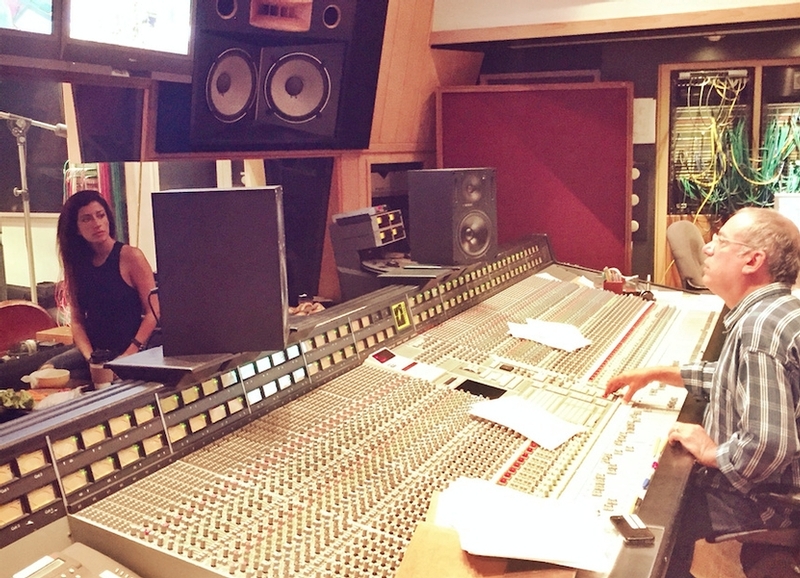
Music producer Larry Klein in the studio with musician Ana Moura.
Artists such as Joni Mitchell, Tracy Chapman and Herbie Hancock have a catalog of fantastic songs and albums that have influenced many musicians. But behind the scenes of every hit record is a key person who has helped made their work great - the producer.
Larry Klein has been producing music since the 1980s and has worked with a wide variety of artists - including those listed above. He's best known for his work with Mitchell (his former wife), which won him Grammy Awards for the albums "Turbulent Indigo" and "Both Sides Now." He also won for "River: The Joni Letters" - a jazz tribute to Mitchell performed by Hancock.
Klein is nominated for pop music Producer of the Year at this year's Grammys for his work with Lizz Wright, Luciana Souza and many more. The Frame's Oscar Garza spoke with Klein about working with Herbie Hancock and Joni Mitchell, and how he - as a producer - gets his emotions across in the music.
INTERVIEW HIGHLIGHTS
What exactly does a producer do?
For me, it involves identifying and locating what in an artist is magical. I think that the job has changed through the years. Perhaps in the '50s, the producer was the guy to make sure that things didn't go over budget. I remember talking to Herbie [Hancock] about Creed Taylor. When I was growing up, CTI...
His great label.
Yeah, he did all those great records and I asked Herbie, "What was he like? What would you see him doing in the studio?" And he said, "Well, he read the paper a lot." I said, "Okay, there must have been more than that." Because there's a consistency aesthetically through all those records that holds true in every way. [Hancock] said, "Well, you know, actually what he would do is he would quietly go around to each player and whisper things in their ear and say something. He might say just a few words or a little bit of a nudge one way or another."
As I've been doing this job longer and longer, I see how valuable it is to know when not to say a lot. Getting back to the Herbie record, one of the big challenges for me on that record was that I was directing - here I had Herbie, Wayne Shorter and Dave Holland in the studio. That was a bit spooky for me because these are my heroes.
We had been having a tough time. It was the toughest tune on the record, a song called "Amelia," which is kind of a complex song. I remember saying over the [intercom] to Dave Holland, "Can you just hold a note through those two bars?" And silence [laughs]. So I knew that I had reached the end of his patience.
You were actually a bass player and you've played with a lot of different artists for a lot of different producers. Who did you learn from? Were there people in particular that stood out for you in that experience?
Oh yeah! Certainly Joni Mitchell. I couldn't quantify how much I learned from working with her, which was not easy because she had never had a producer before and she asked me to be a part of these records that we made together.
What was the first one?
Well, the first one that I played on was "Wild Things Run Fast," and she ended up wanting me to occupy a producer-place with her on that. All of the following records we collaborated together. A lot of that was my education, in many ways, of how to do the job. I certainly made plenty of mistakes and was called on the carpet for every single one of them and learned very quickly.
What was the most meaningful experience with the records that you did with Joni Mitchell. Was there a particular album or song that really stood out?
Well, the first example that comes to mind is on the record, "Both Sides Now." Our initial idea was to do a record of standards that follow the arc of a relationship. It was an appropriate record for us to work on together because we had been through it. Then we decided to put two of her songs into that group of songs. One was "A Case of You," which we put at the halfway point, and then one was "Both Sides Now" which we put as a summation at the end.
We had Herbie Hancock play on the record, as we did Wayne Shorter. Herbie told me that he and Wayne sat through both of those tracks and just cried all the way through. We really hit on something with both of these things. I knew that because it made me feel the same way every time I heard it. When it went out into the world, it really had the same affect on a lot of people and seemed to strike that same nerve inside most people who heard those tracks.
Copyright protected material on this website is used in accordance with 'Fair Use', for the purpose of study, review or critical analysis, and will be removed at the request of the copyright owner(s). Please read Notice and Procedure for Making Claims of Copyright Infringement.
Added to Library on January 27, 2016. (4456)
Comments:
Log in to make a comment